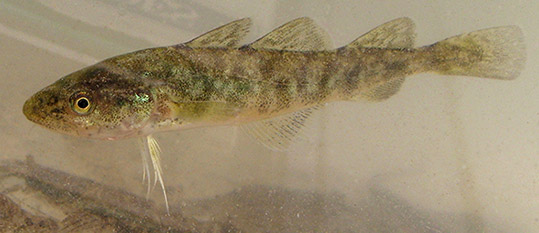Atlantic Tomcod
Atlantic tomcod are olive-green or brown, with dark blotches or spots scattered over their bodies. They may grow up to sixteen inches long, but most don’t exceed one foot. Tomcod live close to the bottom, using the barbel under the mouth to detect food. Adults are usually found in brackish or salty water, but in winter they swim up into fresh water to lay their eggs, often while the Hudson is covered with ice. In years past, people would cut long openings in the ice and lower nets through the openings to catch “tommycod.”
Tomcod like cold water and the Hudson River is at the southern end of their range. Tomcod are one of the many species of fish and wildlife that may be affected by climate change. The Hudson is slowly warming and may cease to be a suitable habitat for this fish.

